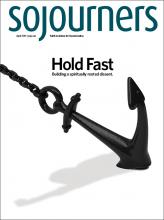ONE SPACE WHERE I find rest, amid the noise of living and working in Washington, D.C., sits directly in the heart of the hustle: the Newseum, dedicated to the defense of Amendment 1 to the U.S. Constitution.
It may be an odd choice, since it exhibits the front page of 60 newspapers each morning, each listing the harrowing headlines I’m trying to escape. But in this space, dedicated to education on our First Amendment freedoms, I find special solace.
Etched on a large window overlooking Pennsylvania Avenue between the White House and the Capitol are these words: “Freedom of Press Speech Religion.”
There is not much breathing room between those freedoms inherent to all Americans, nor between those listed separately: freedom of assembly and petition.
It’s a well-placed reminder about freedoms many Americans take for granted. In 2016, 39 percent of Americans could not name a single one of them. Fifty-four percent could name freedom of speech, but only 17 percent and 11 percent could name freedom of religion and freedom of the press, respectively.
When freedoms don’t “feel” threatened, it’s easy to take them for granted.
Enter 2017. Already this year, we’ve experienced attacks on the freedom of religion as evidenced by the surge in Islamophobic and anti-Semitic attacks and the Trump administration’s failure to mention Jews or anti-Semitism in its Holocaust Remembrance Day statement (a stark departure from the previous six administrations). We’ve seen lawyers spill pro bono hours in airports defending the freedom of religion by enforcing legal protections for international travelers in the face of what appeared to be a “religious test” for entering the country.
People of faith across the U.S. and across party lines rightly have been outraged at potential infringement of religious liberty under the Trump administration.
Read the Full Article

